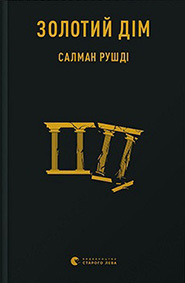You need to sign in or sign up before continuing.
Take a photo of a barcode or cover
This was preeetttyy good. I'd recommend it.
Too wordy, allegorical and intellectual for me. I got bored and skimmed the last few chapters just to make it stop.
Not counting Haroun and the Sea of Stories, which I read as a kid and don't really remember, The Golden House is the first Salman Rushdie book I've read. It tells the story of the Golden family -- father, three sons -- who moves from a country initially kept secret to America. They completely change their identities, shaking off a tragic past to plunge into an equally tragic future. The story is told from the point of view of their young neighbor, who enters their world as a fly on the wall hoping to craft a film based on their lives, but ends up hopelessly entangled in each family member's increasingly wild conflicts and destinies.
I've mixed feelings about this book. In concept, it fascinates me -- everything from the form, to the characters, to the plot. Rushdie's pacing in revelation, the way he unfolds the lives of all his characters, is compellingly done. The narrator, Rene, serves as a Nick Carraway type. His knowledge of film -- encyclopedic and constantly displayed using allusions. His voice -- eschewing commas, winding, parenthetical, idiosyncratic, vaguely Wes Anderson-esque reminiscent of Fantastic Mr. Fox. It infects all moments of the novel, even the dialogue, much of which is inferred and constructed by Rene anyway. He hypothesizes scenes, constructing them in the style of a movie script or exploring a character through a monologue. At times it felt as though the narrative was bogged down by it, but I suppose that's the nature of Rene's character. As his partner Suchrita says, bits of Rene finds bits of himself reflected in each of his subjects, and so it goes with the voice of his narration.
Perhaps the most jarring aspect of the novel is the politics. Rushdie's examination of the 2016 election runs as explicit as possible without actually naming Trump or Clinton, yet it's rife with metaphors (mostly involving comparisons between Trump to the joker). It feels out of touch with the plot of the novel, which centers on the relationships between the Goldens and those they surround themselves with. Perhaps I'm missing the grand connection, but it came off as gimmicky. Rushdie also dives into themes like race, neurodivergence, and most intensely, gender fluidity -- yet they are hardly skimmed. Or -- treated with Rene's halting, wry tone so it's difficult to discern which stances or ideas are presented genuinely or satirically.
On the political element, I'm torn. One side of me wants to say that The Golden House would have been a better novel had the explicit references to today's political circumstances been omitted because of the way they clash with the meat of the novel. Another side of me wonders if I'm missing a piece to the puzzle. And yet another suggests that maybe The Golden House simply tries to portray a fact of life -- sometimes our personal lives and our politics converge very explicitly, while other times politics (politics as in governance and elections, not the identity politics which lies at the heart of the novel) takes a backseat -- but it's always there, and we must always take the time to acknowledge and confront it.
Overall, I definitely enjoyed The Golden House. As a writer, I took notes on Rene's narration. I marveled at the characters whose lives are so intensely messy and intricately portrayed that to try and even summarize them here would be impossible and insufficient. More than anything, I loved how the book felt as opulent as its subjects -- bejeweled sentences that traced outlandish histories, extravagant, eccentric characters, and all the tragedy and melodrama of a soap opera. The Golden House seems a study in excess, one that will either have you setting the book down as I was tempted to, having gotten your fill within the first fifty pages -- or that will keep the pages turning in a binge that I think is well worth it.
I've mixed feelings about this book. In concept, it fascinates me -- everything from the form, to the characters, to the plot. Rushdie's pacing in revelation, the way he unfolds the lives of all his characters, is compellingly done. The narrator, Rene, serves as a Nick Carraway type. His knowledge of film -- encyclopedic and constantly displayed using allusions. His voice -- eschewing commas, winding, parenthetical, idiosyncratic, vaguely Wes Anderson-esque reminiscent of Fantastic Mr. Fox. It infects all moments of the novel, even the dialogue, much of which is inferred and constructed by Rene anyway. He hypothesizes scenes, constructing them in the style of a movie script or exploring a character through a monologue. At times it felt as though the narrative was bogged down by it, but I suppose that's the nature of Rene's character. As his partner Suchrita says, bits of Rene finds bits of himself reflected in each of his subjects, and so it goes with the voice of his narration.
Perhaps the most jarring aspect of the novel is the politics. Rushdie's examination of the 2016 election runs as explicit as possible without actually naming Trump or Clinton, yet it's rife with metaphors (mostly involving comparisons between Trump to the joker). It feels out of touch with the plot of the novel, which centers on the relationships between the Goldens and those they surround themselves with. Perhaps I'm missing the grand connection, but it came off as gimmicky. Rushdie also dives into themes like race, neurodivergence, and most intensely, gender fluidity -- yet they are hardly skimmed. Or -- treated with Rene's halting, wry tone so it's difficult to discern which stances or ideas are presented genuinely or satirically.
On the political element, I'm torn. One side of me wants to say that The Golden House would have been a better novel had the explicit references to today's political circumstances been omitted because of the way they clash with the meat of the novel. Another side of me wonders if I'm missing a piece to the puzzle. And yet another suggests that maybe The Golden House simply tries to portray a fact of life -- sometimes our personal lives and our politics converge very explicitly, while other times politics (politics as in governance and elections, not the identity politics which lies at the heart of the novel) takes a backseat -- but it's always there, and we must always take the time to acknowledge and confront it.
Overall, I definitely enjoyed The Golden House. As a writer, I took notes on Rene's narration. I marveled at the characters whose lives are so intensely messy and intricately portrayed that to try and even summarize them here would be impossible and insufficient. More than anything, I loved how the book felt as opulent as its subjects -- bejeweled sentences that traced outlandish histories, extravagant, eccentric characters, and all the tragedy and melodrama of a soap opera. The Golden House seems a study in excess, one that will either have you setting the book down as I was tempted to, having gotten your fill within the first fifty pages -- or that will keep the pages turning in a binge that I think is well worth it.
mysterious
slow-paced
Plot or Character Driven:
Character
Strong character development:
Complicated
Loveable characters:
No
Diverse cast of characters:
Yes
Flaws of characters a main focus:
Yes
And so it begins...
"What is a good life? What is its opposite? These are questions to which no two men will give the same answers. In these our cowardly times, we deny the grandeur of the Universal, and assert and glorify our local Bigotries, and so we cannot agree on much. In these our degenerate times, men bent on nothing but vainglory and personal gain- hollow, bombastic men for whom nothing is off-limits if it advances their petty cause- will claim to be great leaders and benefactors, acting in the common good, and calling all who oppose them liars, envious, little people, stupid people, stiffs, and, in a precise reversal of the truth, dishonest and corrupt. We are so divided, so hostile to one another, so driven by sanctimony and scorn, so lost in cynicism, that we call our pomposity idealism, so disenchanted with our rulers, so willing to jeer at the institutions of our state, that the very word goodness has been emptied of meaning and needs, perhaps, to be set aside for a time, like all other poisoned words, spirituality, for example, final solution, for example, and (at least when applied to skyscrapers and fried potatoes) freedom."
And so it ends...
"It had been more than a year since the Joker's conquest of America and we were all still in shock and going through the stages of grief but now we needed to come together and set love and beauty and solidarity and friendship against the monstorous forces that faced us. Humanity was the only answer to the cartoon."
"What is a good life? What is its opposite? These are questions to which no two men will give the same answers. In these our cowardly times, we deny the grandeur of the Universal, and assert and glorify our local Bigotries, and so we cannot agree on much. In these our degenerate times, men bent on nothing but vainglory and personal gain- hollow, bombastic men for whom nothing is off-limits if it advances their petty cause- will claim to be great leaders and benefactors, acting in the common good, and calling all who oppose them liars, envious, little people, stupid people, stiffs, and, in a precise reversal of the truth, dishonest and corrupt. We are so divided, so hostile to one another, so driven by sanctimony and scorn, so lost in cynicism, that we call our pomposity idealism, so disenchanted with our rulers, so willing to jeer at the institutions of our state, that the very word goodness has been emptied of meaning and needs, perhaps, to be set aside for a time, like all other poisoned words, spirituality, for example, final solution, for example, and (at least when applied to skyscrapers and fried potatoes) freedom."
And so it ends...
"It had been more than a year since the Joker's conquest of America and we were all still in shock and going through the stages of grief but now we needed to come together and set love and beauty and solidarity and friendship against the monstorous forces that faced us. Humanity was the only answer to the cartoon."
Bombastic and over the top, in a good way. Not my favourite by Rushdie but I wasn't disappointed either
adventurous
challenging
medium-paced
Plot or Character Driven:
Character
Strong character development:
Yes
Loveable characters:
Complicated
Flaws of characters a main focus:
Yes
The story was pretty good, the writing was great, and I loved reading about the Joker and today's political/social climate as a backdrop. I definitely enjoyed this book.
DNF at 25% and I'm so so sad about that. Maybe someone needs to convince me to soldier on but that's my limit. I wasn't looking forward to picking the book back up and couldn't REALLY get into it. I might go back and try a little more. Here's the thing... it's a bit "high brow" literature, which I DO enjoy. I'm an English teacher and understood references to something being Prufrocked and "Nietzschean elitism." But some references like "This is Baba Yaga..." huh? Thank God I read on a Kindle now so I could quickly read about it, go ah ok and move on. The book needs footnotes! The problem was - this was happening frequently and I kept questioning, "what's the STORY here" lost feeling, instead sensing that I was MISSING something. I'm betwixt here as I love a challenge and to learn while reading, but also I need a story to keep my attention, to become involved with characters. By 25% I didn't fully understand the narrator's role other than some semi-kooky film maker, that there's this family and they all live in one of the most expensive areas of NYC, and they are mysterious. A new sexy model lady was going after the dad so maybe it grows after that... again... opinions would be welcomed if I should truck or bail.... but for now it's bail.
Disclosure: I received a complimentary copy of this book from the publisher, via Goodreads, in exchange for a honest review.
This was my first Salman Rushdie book, and oh good gracious I will be moving his other novels up my TBR pile. This was wonderful.
But it was not an easy read. The story is a mirror for the 8 years of Obama's presidency, narrated by an aspiring film-maker and follows a wealthy immigrant family through the ups and downs of their lives. Rusdie's writing is chock full of social commentary, both American and global, and dozens of film, literary and pop-culture allusions that many readers might miss. I am sure I missed a few myself, and I started reading with google open so that I could double check references whenever I suspected I was missing a point. That is why this book took me so long... there was a lot to digest. Half of the points Rushdie was trying to make weren't even a part of the story -- they were reflected in his choice of words, or his choice of metaphor.
Smart writing like this gets my juices going and I really really enjoyed reading this book, but I am exhausted by it too. Nonetheless, every second was worthwhile. Every word held multiple meanings. Every page was a reward. I understand completely why Salman Rushdie is so revered.
This was my first Salman Rushdie book, and oh good gracious I will be moving his other novels up my TBR pile. This was wonderful.
But it was not an easy read. The story is a mirror for the 8 years of Obama's presidency, narrated by an aspiring film-maker and follows a wealthy immigrant family through the ups and downs of their lives. Rusdie's writing is chock full of social commentary, both American and global, and dozens of film, literary and pop-culture allusions that many readers might miss. I am sure I missed a few myself, and I started reading with google open so that I could double check references whenever I suspected I was missing a point. That is why this book took me so long... there was a lot to digest. Half of the points Rushdie was trying to make weren't even a part of the story -- they were reflected in his choice of words, or his choice of metaphor.
Smart writing like this gets my juices going and I really really enjoyed reading this book, but I am exhausted by it too. Nonetheless, every second was worthwhile. Every word held multiple meanings. Every page was a reward. I understand completely why Salman Rushdie is so revered.



